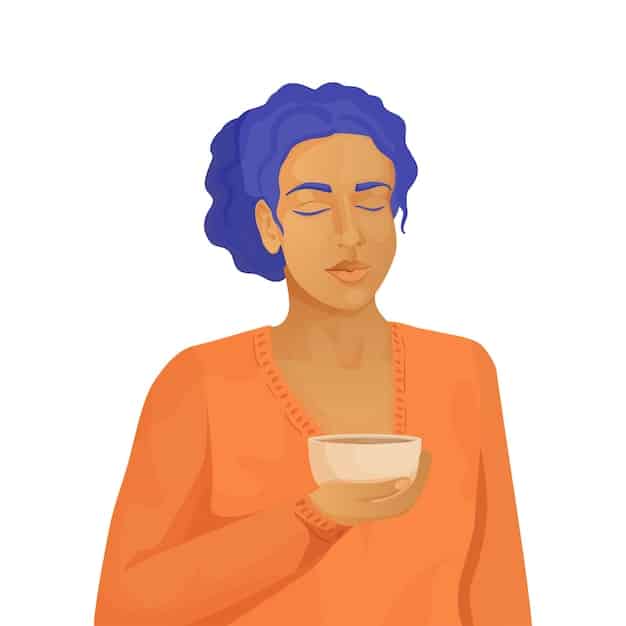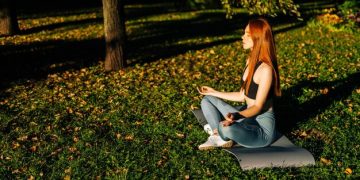Mindfulness for Anxiety: Proven Techniques & Tips

Mindfulness for anxiety involves practices that center your awareness on the present moment, helping to manage overwhelming thoughts and emotions, and proven techniques can significantly reduce anxiety levels and improve overall mental well-being.
Anxiety can feel like a relentless storm in your mind, but there’s a way to navigate it with greater ease. Discover how mindfulness for anxiety can be a powerful tool, offering proven techniques to help you manage anxious thoughts, regain control, and find a sense of calm amidst the chaos.
Understanding Anxiety and the Role of Mindfulness
Anxiety disorders affect millions worldwide, disrupting daily life and creating significant distress. But what exactly is anxiety, and how can mindfulness provide a pathway to relief? Let’s delve into the foundations of anxiety and explore the core principles of mindfulness.
What is Anxiety?
Anxiety is more than just feeling stressed or worried. It’s a pervasive condition characterized by excessive fear, worry, and apprehension. It can manifest in various forms, including generalized anxiety disorder, social anxiety disorder, panic disorder, and specific phobias.
How Mindfulness Helps
Mindfulness offers a different approach. It involves paying attention to the present moment without judgment, allowing you to observe your thoughts and feelings without getting carried away by them. This can create space between you and your anxiety, giving you more control over your reactions.
- Reduces overthinking and rumination.
- Promotes emotional regulation.
- Increases self-awareness and acceptance.
- Cultivates a sense of calm and presence.
By practicing mindfulness, you can learn to become more aware of your anxiety triggers, identify unproductive thought patterns, and develop healthier coping mechanisms. It’s about training your mind to be present, rather than dwelling on the past or worrying about the future.

In essence, mindfulness for anxiety isn’t a cure, but a skill that empowers you to manage your symptoms more effectively. It’s a journey of self-discovery and self-compassion, enabling you to navigate the challenges of anxiety with greater resilience and inner peace.
Proven Mindfulness Techniques for Anxiety
Several mindfulness techniques have been proven effective in managing anxiety. These techniques can be easily incorporated into your daily routine, providing you with practical tools to reduce stress and promote relaxation. Let’s explore some of the most popular and effective mindfulness exercises.
Mindful Breathing
Mindful breathing involves focusing your attention on the sensation of your breath as it enters and leaves your body. This simple practice can help calm your nervous system and bring you back to the present moment.
Body Scan Meditation
A body scan meditation involves bringing awareness to different parts of your body, noticing any sensations without judgment. This practice can help you become more attuned to your physical sensations and release tension.
- Start by lying down or sitting comfortably.
- Begin by focusing on your toes, noticing any sensations.
- Gradually move your attention up your body, paying attention to each part.
- If you notice any discomfort, simply acknowledge it and breathe through it.
Both mindful breathing and body scan meditation can be practiced anywhere, anytime, making them valuable tools for managing anxiety on the go. They can help you ground yourself in the present, interrupt anxious thought patterns, and cultivate a sense of inner calm.
By consistently practicing these techniques, you can significantly reduce your anxiety levels and improve your overall well-being. The key is to be patient with yourself and to approach each practice with kindness and acceptance.
Integrating Mindfulness into Daily Life
Mindfulness isn’t just something you practice during formal meditation sessions. It’s a way of being that you can integrate into all aspects of your life. By bringing mindful awareness to everyday activities, you can transform mundane moments into opportunities for growth and well-being.
Mindful Eating
Mindful eating involves paying attention to the taste, texture, and aroma of your food, savoring each bite without distraction. This practice can help you develop a healthier relationship with food and reduce emotional eating.
Mindful Walking
Mindful walking involves bringing awareness to the sensation of your feet as they touch the ground, noticing the movement of your body and the sights and sounds around you. This practice can help you connect with your surroundings and relieve stress.
Integrating mindfulness into daily life is about cultivating a heightened awareness of your experiences, both internal and external. It’s about slowing down, paying attention, and appreciating the simple moments that often go unnoticed. When anxiety is lessened, it allows you to get back to the simple things in life.

By consciously incorporating mindfulness into your daily routine, you can reduce stress, enhance your sense of well-being, and cultivate a deeper connection with yourself and the world around you. Remember, mindfulness isn’t about perfection, but about progress. Every small act of mindful awareness makes a difference.
Overcoming Challenges in Mindfulness Practice
Embarking on a mindfulness practice can be incredibly rewarding, but it’s not without its challenges. Many people experience difficulties such as a wandering mind, impatience, or resistance. Understanding these challenges and developing strategies to overcome them is crucial for establishing a sustainable and effective mindfulness practice.
Dealing with a Wandering Mind
It’s perfectly normal for your mind to wander during mindfulness practice. The key is not to judge yourself or get frustrated, but to gently redirect your attention back to your chosen focus, such as your breath or body sensations.
Impatient and Resistance
It takes time and dedication to develop a strong mindfulness practice. Be patient with yourself and celebrate the small victories. If you’re feeling resistant, try shortening your practice sessions or exploring different techniques until you find something that resonates with you.
- Start with short, manageable sessions.
- Experiment with different techniques.
- Be kind and compassionate to yourself.
- Seek guidance from experienced teachers or practitioners.
By embracing these challenges as opportunities for growth, you can deepen your mindfulness practice and cultivate greater resilience in the face of adversity. Remember that mindfulness is a journey, not a destination, and every step you take is a step in the right direction.
Overcoming the challenges in mindfulness practice requires patience, self-compassion, and a willingness to learn from your experiences. With persistence and dedication, you can develop a strong and sustainable mindfulness practice that supports your well-being and helps you navigate the challenges of anxiety with greater ease.
The Science Behind Mindfulness and Anxiety
While mindfulness may seem like a simple practice, it has a profound impact on the brain and body. Scientific research has consistently demonstrated the effectiveness of mindfulness in reducing anxiety and promoting overall well-being. Let’s explore some of the key findings from the field of neuroscience.
Brain Changes
Studies have shown that regular mindfulness practice can lead to structural changes in the brain, particularly in areas associated with attention, emotion regulation, and self-awareness. These changes include increased gray matter density in the prefrontal cortex and decreased activity in the amygdala, the brain’s fear center.
Stress Reduction
Mindful practices have proven to alleviate anxiety and stress. Practicing mindfulness can effectively lower cortisol levels, the hormone associated with stress. By reducing cortisol levels, mindfulness helps to calm the body’s stress response and promote relaxation.
- Lowering blood pressure and heart rate.
- Improving sleep quality.
- Boosting the immune system.
- Reducing inflammation.
The scientific evidence supporting the benefits of mindfulness for anxiety is compelling. By understanding the underlying mechanisms, you can gain a deeper appreciation for the power of this practice and its potential to transform your mental and physical health.
The growing body of research on mindfulness and anxiety provides a solid foundation for its widespread adoption as a valuable tool for self-care and mental wellness. By embracing mindfulness, you can leverage the power of your mind to cultivate a greater sense of calm, balance, and resilience in your life.
Resources for Learning and Practicing Mindfulness
To deepen your understanding and practice of mindfulness, a wealth of resources are available to support you on your journey. From books and websites to apps and retreats, you can find a variety of tools and guidance to help you cultivate a mindful way of life. Let’s explore some of the most popular and effective resources.
Books and Websites
Numerous books and websites offer comprehensive information on mindfulness, including its principles, techniques, and benefits. Some popular options include the works of Jon Kabat-Zinn, Thich Nhat Hanh, and Sharon Salzberg. Websites like Mindful.org and the UCLA Mindful Awareness Research Center provide articles, guided meditations, and other useful resources.
Apps and Guided Meditations
Many apps offer guided meditations, mindfulness exercises, and other tools to support your practice on the go. Popular options include Headspace, Calm, and Insight Timer. These apps provide a convenient and accessible way to incorporate mindfulness into your daily routine.
The abundance of resources available for learning and practicing mindfulness makes it easier than ever to embark on this transformative journey. Whether you prefer books, websites, apps, or in-person guidance, you can find the tools and support you need to cultivate a mindful way of life and manage your anxiety with greater ease.
| Key Point | Brief Description |
|---|---|
| 🧘 Mindful Breathing | Focusing on your breath to calm the nervous system. |
| 🚶 Mindful Walking | Paying attention to the sensation of walking for stress relief. |
| 🧠 Body Scan Meditation | Bringing awareness to different body parts to release tension. |
| 🍎 Mindful Eating | Savoring each bite of food to develop a healthier relationship with eating. |
Frequently Asked Questions
▼
Mindfulness is the practice of paying attention to the present moment without judgment. It involves focusing on your thoughts, feelings, and sensations as they arise, without getting carried away by them.
▼
It can help reduce anxiety by promoting emotional regulation, increasing self-awareness, and cultivating a sense of calm. It allows you to observe anxious thoughts without getting caught up in them.
▼
Mindfulness is not a cure for anxiety, but it can be a powerful tool for managing symptoms and improving overall well-being. It can help you develop healthier coping mechanisms and reduce the impact of anxiety on your life.
▼
The more frequently you practice mindfulness, the greater the benefits you’ll experience. Aim for at least 10-15 minutes of practice each day, but even a few minutes can make a difference. Consistency is key.
▼
It’s normal for your mind to wander during mindfulness practice. When you notice your mind wandering, gently redirect your attention back to your chosen focus, such as your breath or body sensations, without criticizing yourself.
Conclusion
Mindfulness for anxiety offers a powerful and proven approach to managing anxiety and regaining control of your thoughts. By incorporating mindfulness techniques into your daily life, you can cultivate a greater sense of calm, balance, and resilience, empowering you to navigate the challenges of anxiety with greater ease and well-being.





